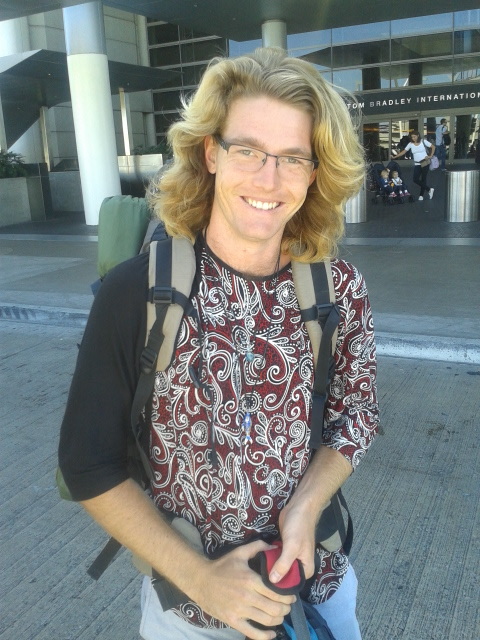|
One of the most interesting things about Thailand is its government. Unlike many Western countries, Thailand has never been a full democracy. There is a long history of authoritarian rule here (authoritarian is when one person, or a group of people, have much more power than everyone else – they author the laws, and enforce them as well), and in the last few years, rising tensions between different groups of people have resulted in violence. Now, a military government has stepped in to stabilize the country, although many are worried that they will stay for much longer than is necessary. Just last week, Thailand's constitutional drafting committee rejected its own draft – the 20th try at a Thai constitution – and it'll be about two years before the next public election.
Here, if you criticize the King and Queen, even past kings and queens, you can get sent to prison for 20 or 30 years. Other restrictions on free speech make press coverage of certain issues dangerous. As a Westerner, I have my own views of these laws. But I've also had some interesting conversations with educated Thais who like it this way. "I prefer an authoritarian form of government," one of my schoolmates told me over dinner a few nights ago. "I think it's important for people to have an example to look up to, and in America, where you have all this freedom, people still just want more and more. So I don't think that's any better." My first thought at hearing this was, "Wow, your education system did a good job." The history that Thai students are taught in school is all about the greatness of Thailand's kings, and it tells students about all the ways in which they protected the nation from its evil neighbors. People learn, from an early age, that without the King and Queen, who they call "Dad and Mom," society would fall apart. My second thought was, "Wow, my education system did a good job." In America, our national history also tells a certain story. In schools, we pledge allegiance to the flag, and many of us are taught to associate America with virtue ("a shining city on a hill"). At the same time, our policies during the Cold War strengthened Thailand's military as the nation further restricted free speech, labeling any criticism of human rights abuses as "Bolshevik propaganda" and throwing people into jail - or worse. So while I believe that people deserve to have a say in the way that they're governed, it's difficult to say that my friend is wrong. She was just learning history.
0 Comments
This weekend, I chose to stay in Bangkok, as I had a meeting for an internship I'm pursuing here. I won't talk about it too much now, but it includes visiting refugees from Pakistan, Cameroon, and Vietnam at a detention center, basically a prison, where many live for as much as 2 years without gaining an interview. The day after my meeting, I went to a historical park called Muang Boran, or The Ancient City. It's a massive complex, spanning 240 acres, and inside there are miniatures of monuments from throughout Thailand – in fact, the entire park is a to-scale model of the kingdom.
The monuments, while miniatures of the originals, were still huge, with many towering at least 50 feet high. Some of them housed beautiful artworks, mother-of-pearl thrones, and Buddha statues. A river ran through the entire park, complete with its own floating market. It was a surreal experience, made more so by the slight rain that showered down as my friend and I biked through the city. This experience brought up some interesting thoughts. Muang Boran was founded by a man who wanted to educate Thai people about their heritage. He thought that building a historic park that showcased the wonder of Thailand's monuments would inspire people with respect for their own culture. The park is also open to foreigners, and like many attractions in Thailand, it costs twice as much to go if you're not a local. The park took years to complete; the details on many of the buildings required the work of skilled craftsmen, and the architect, Lek Viriyaphant, visited many of the 116 monuments himself to ensure that the replicas were accurate, while experts from the National Museum helped as well. During my time at the park, I had lots of time to think about the importance of religious art. In Thailand, religious symbols are everywhere. Museums like Muang Boran are often filled with Buddha statues and other sacred objects. My question is, what makes something holy? Is a replica of a religious statue just as sacred as the original? Every Thai person that I've seen at a museum has reacted to the statues around them as if they were the originals: they often get down on their knees, light incense, and maintain silence. On the other hand, these statues are housed in a museum that's open to non-Buddhists, like me, who treat them like artwork. My friend Tessa said that objects like Buddha statues are important because of the intention with which they were built, and that she has more respect for the originals than a replica on display. I think I agree with her, but it's a tricky issue, especially since the locals seem to respect the object itself, regardless of the situation. |
Adam De GreeI am a senior in college, studying philosophy, and am visiting family in the Czech Republic and travelling and studying in Europe and Asia. Archives
January 2016
Categories
All
|
|
SUPPORT
|
RESOURCES
|
|


 RSS Feed
RSS Feed



